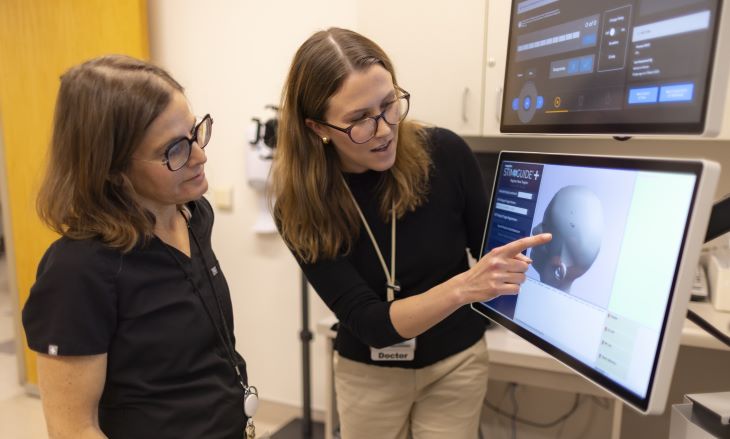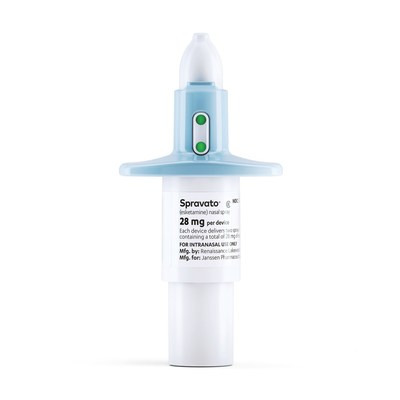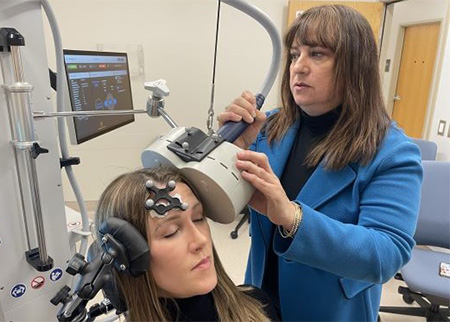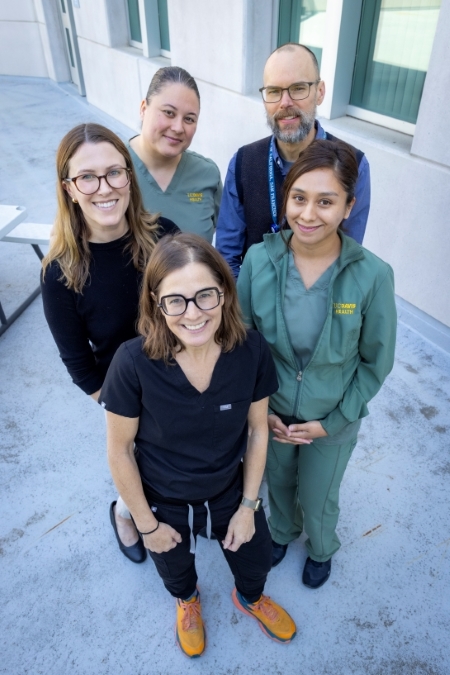The UC Davis Department of Psychiatry and Behavioral Sciences opened its new Advanced Psychiatric Therapeutics (APT) Clinic this week. Located at the Ambulatory Care Center on the Sacramento campus, the facility is dedicated to treating patients with treatment-resistant depression.

"Depression is, unfortunately, a common and potentially devastating illness, and it's becoming more common each year in the United States," said Katharine Marder, a psychiatrist at UC Davis Health who specializes in treatment-resistant depression. "While medications and talk therapy are effective treatments for many people, we also know that one in three people with depression won't respond to those standard treatments."
The APT Clinic offers two new treatment options: transcranial magnetic stimulation (TMS) and esketamine nasal spray.

TMS is a non-invasive treatment that uses gentle pulses of magnetic fields to stimulate nerve cells in the brain. It works differently than standard antidepressant medications, like serotonin reuptake inhibitors (SSRIs), but without their undesirable side effects such as weight changes and sexual dysfunction.
Esketamine (brand name Spravato®) is a nasal spray derived from ketamine. Ketamine is thought to improve symptoms of depression by helping to restore connections between nerve cells in the brain. Esketamine is administered under supervision in a clinic due to the potential for side effects including sedation or dissociation.
Both options treat major depressive disorder and have good response rates. Compared to standard medications for depression, which can take weeks to months for patients to see improvements, the results with esketamine can be rapid, with some patients feeling improvement within days.
"As a provider, it's sad and frustrating when you have patients who have been depressed and are not getting better," said Debra Kahn, director of the new clinic and a professor and clinical psychiatrist in the Department of Psychiatry and Behavioral Sciences. "It's exciting to have these new treatment options, and it makes us feel hopeful that we can help people that we haven't been able to help before."

Candidates for these treatments are adults who have tried two other antidepressants without significant improvement. Physicians work with patients to determine eligibility and to discuss the risks and benefits of each before formulating a treatment plan.
For TMS, patients generally receive daily treatments for the first six weeks, followed by a three-week taper phase in which the frequency is gradually reduced to once per week before treatment is completed. Treatment durations generally last from five minutes to 30 minutes, depending on the protocol prescribed for the individual patient.
For esketamine, patients will generally receive treatment twice weekly for the first month, once weekly for the second month, and once every one to two weeks for maintenance treatment. During their visit to the clinic, patients self-administer the nasal spray and then spend a couple of hours in a relaxing environment while the medication takes effect.
New location in 2025

The clinic's home in the Ambulatory Care Center is temporary. UC Davis Health has leased a 15,000-square-foot permanent space at the Cannery Business Park in East Sacramento, about a mile from UC Davis Medical Center.
The larger facility in the Cannery is undergoing a $20 million renovation and is expected to open next year. It will provide the ability to treat more patients and for patients to participate in clinical trials, including psychedelics as a treatment for depression.
"The treatment options for mental health disorders like depression were very limited for many years," said Helen C. Kales, chair of the Department of Psychiatry and Behavioral Sciences. "But that is changing. We are entering a new era for psychiatry, with promising new medications and treatment options. We are excited to be offering esketamine and TMS for our patients and look forward to offering other new and effective treatments in the future at our new location."
In addition to Kales, Kahn, and Marder, the TMS-certified psychiatrists providing treatment at the new clinic are John Onate, Lorin Scher, Amy Barnhorst, James Alan Bourgeois and Manpreet Singh. Additional members of the care team include Matthew Settle, a psychiatric nurse practitioner; Donna McDonald, a nurse manager; and Leticia Diaz and Mary Lomu Lilomaiava, TMS technicians.






